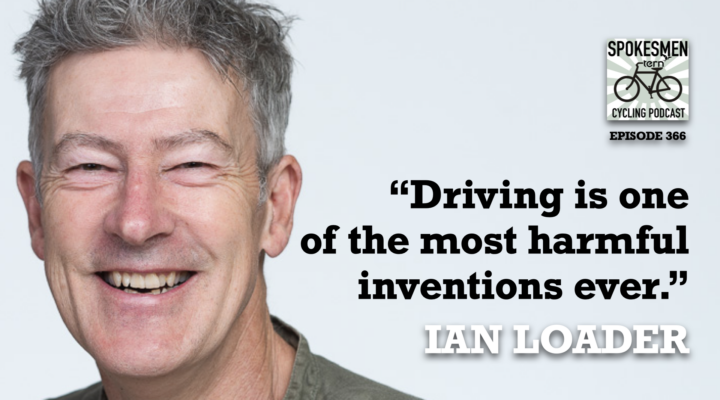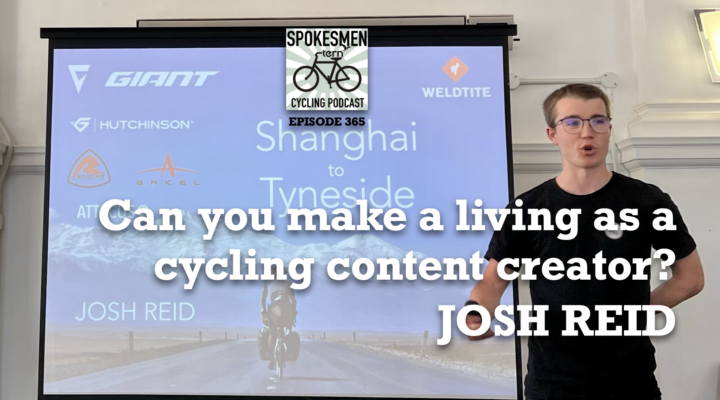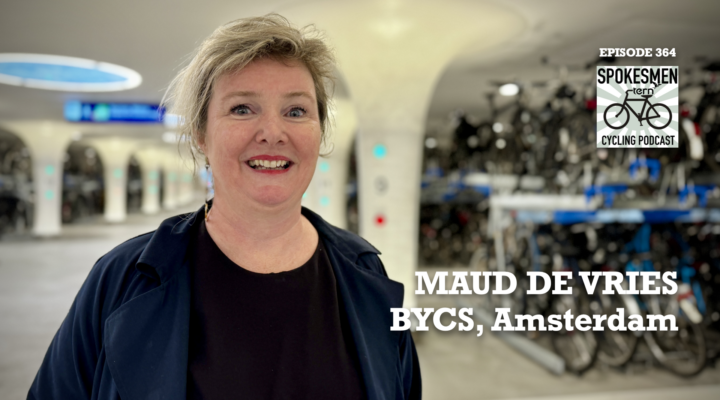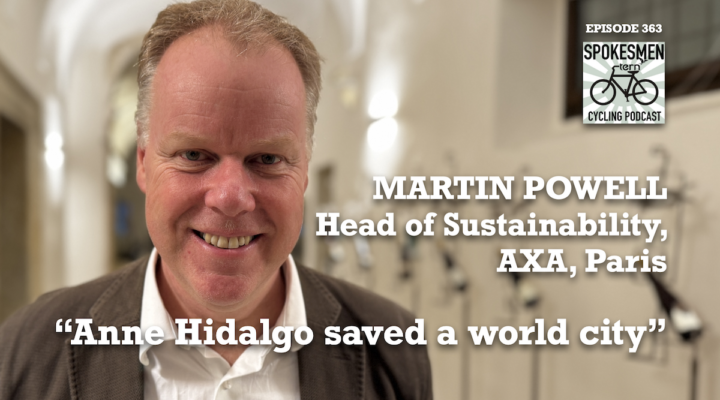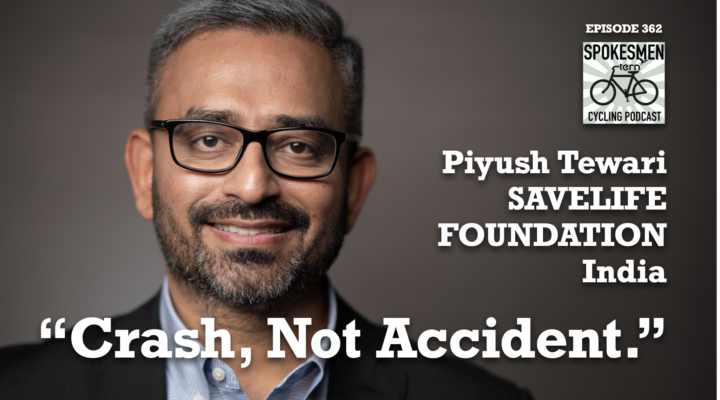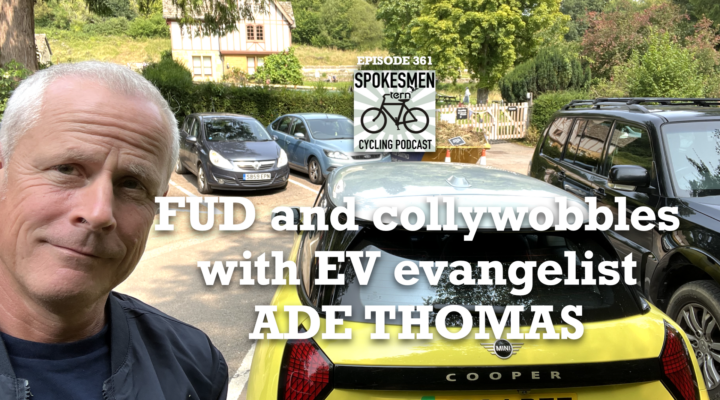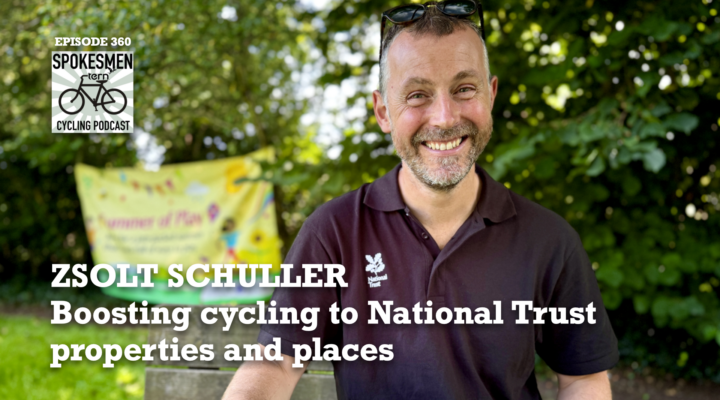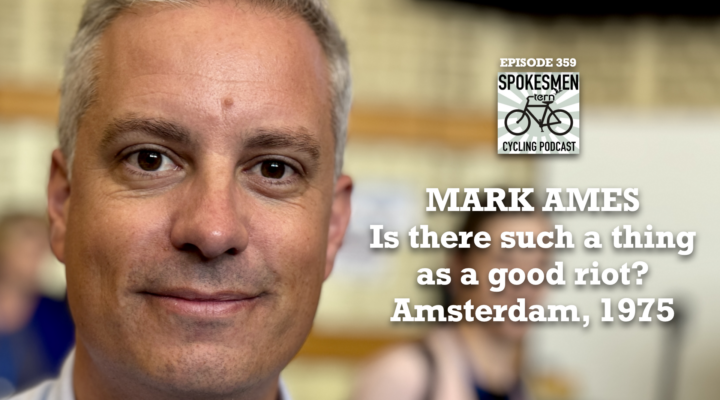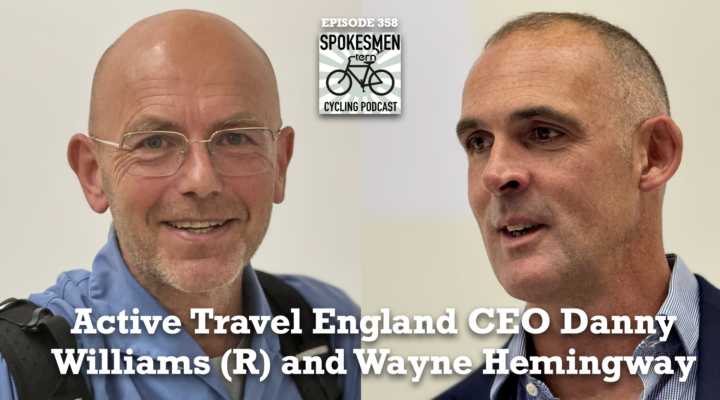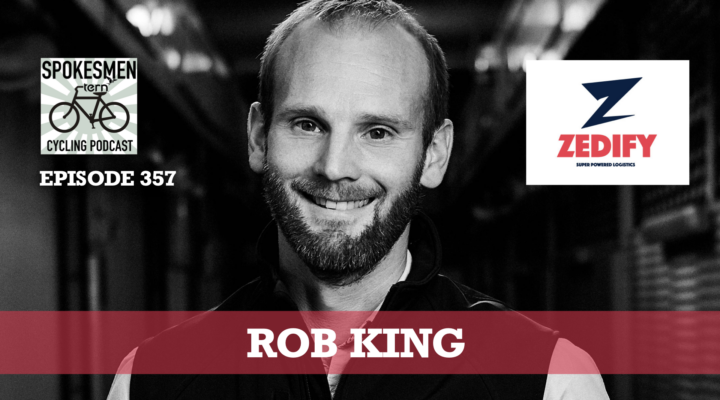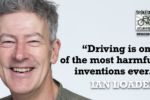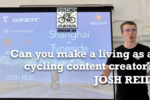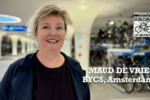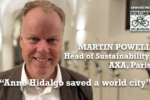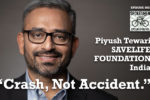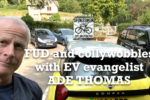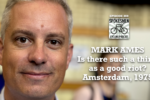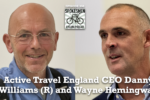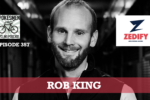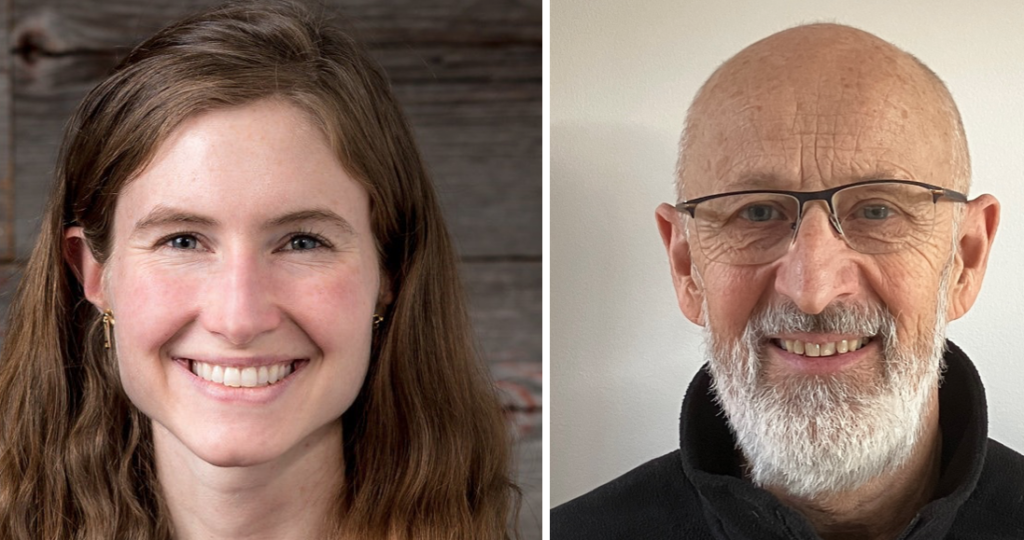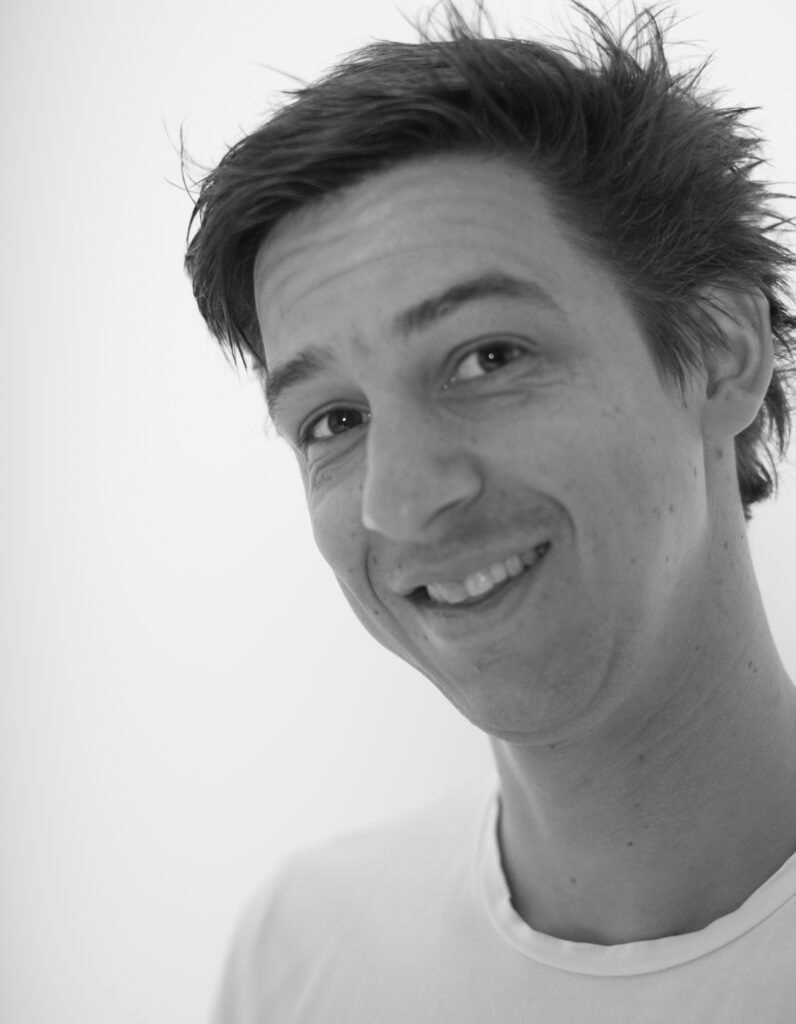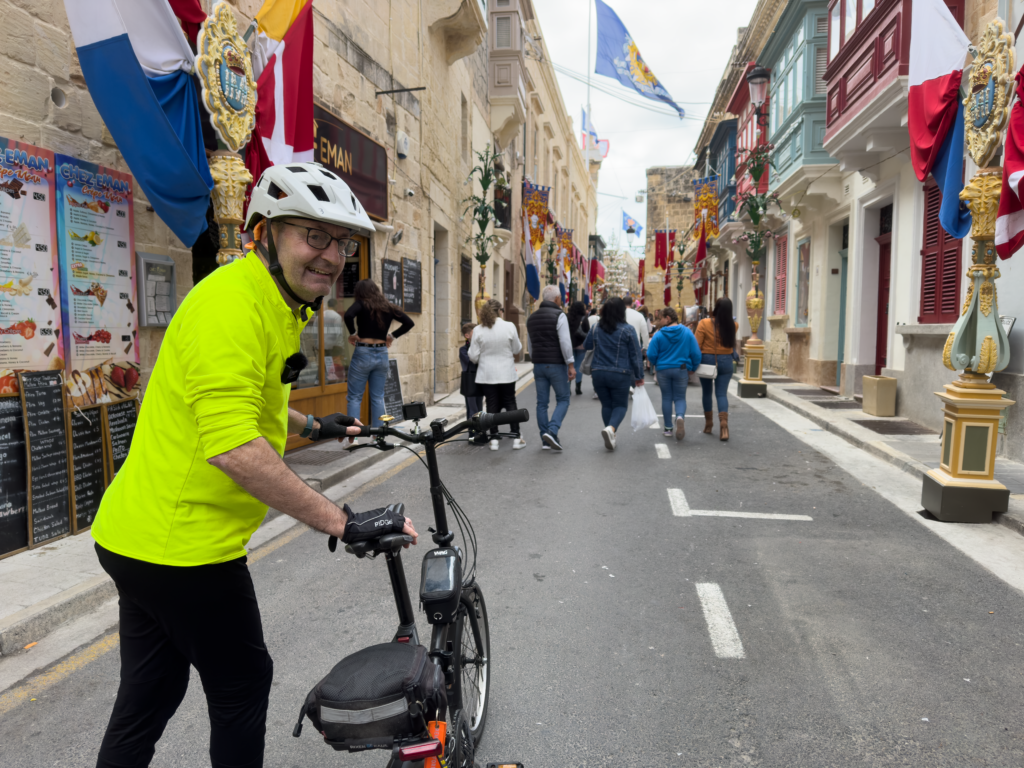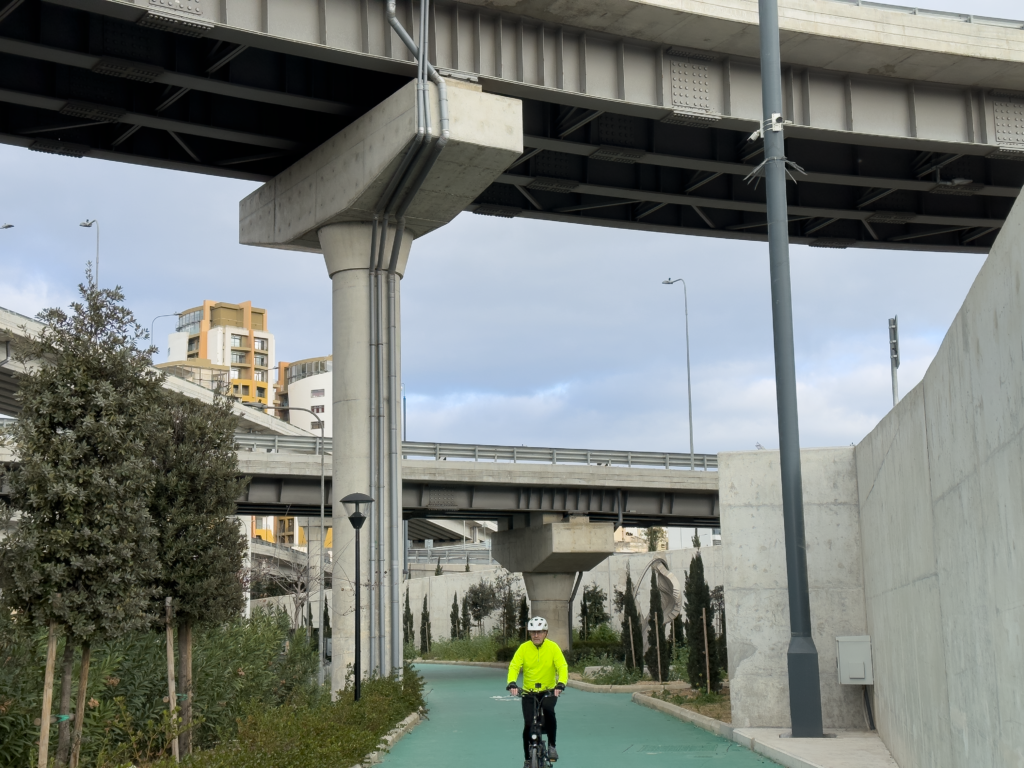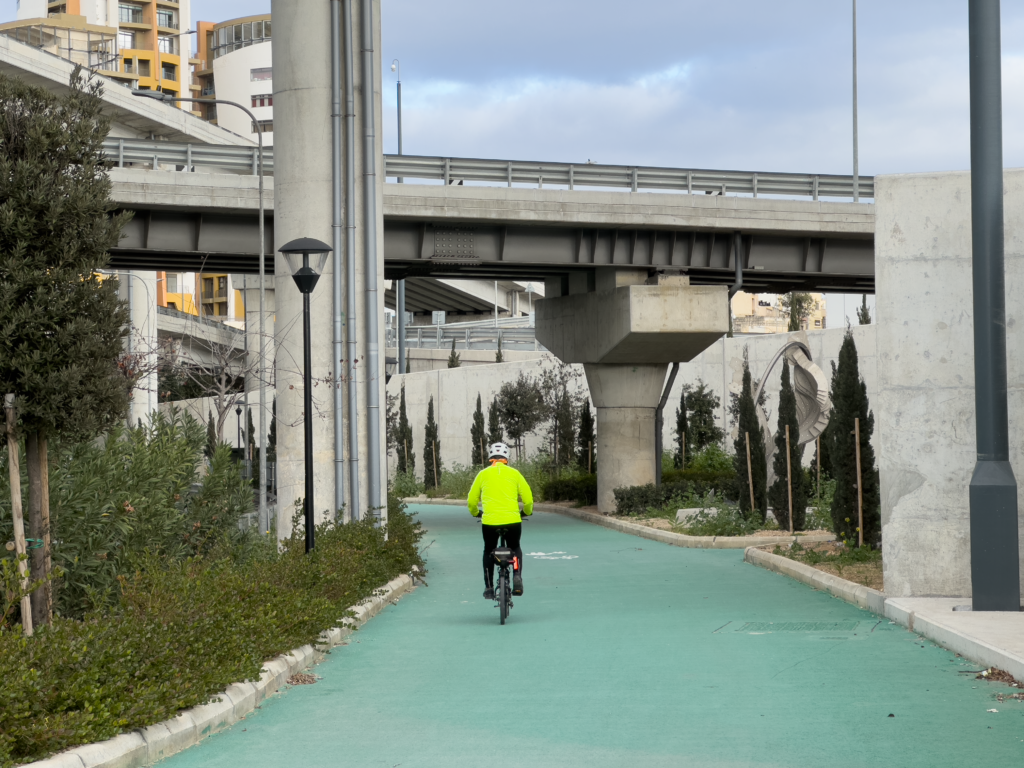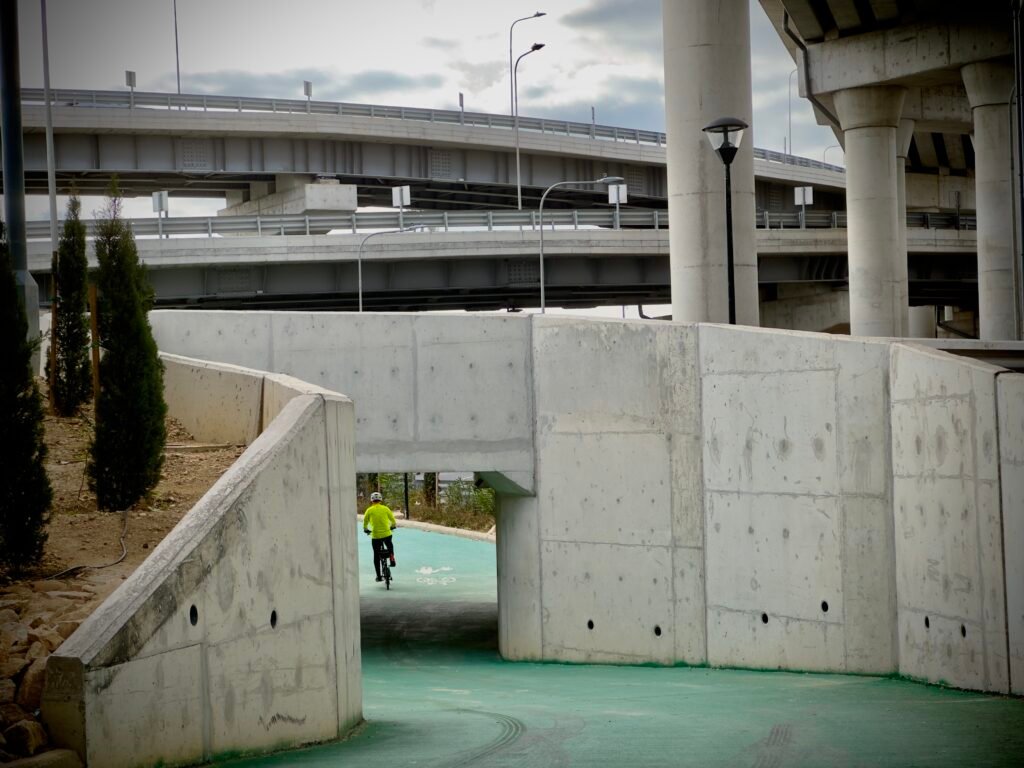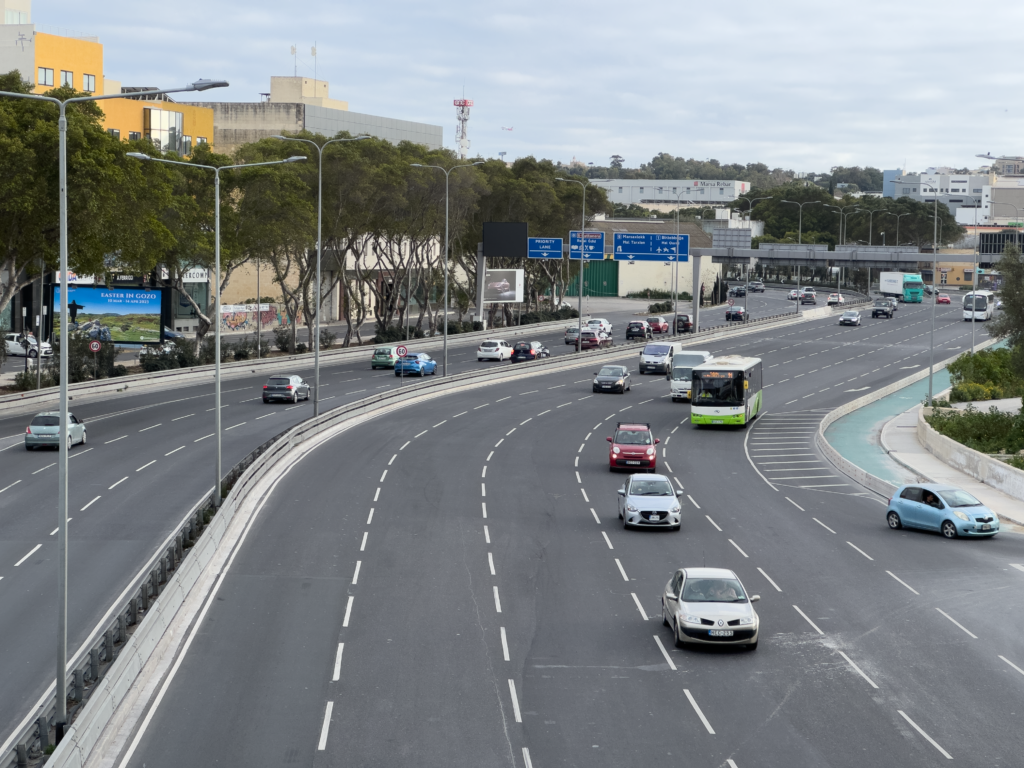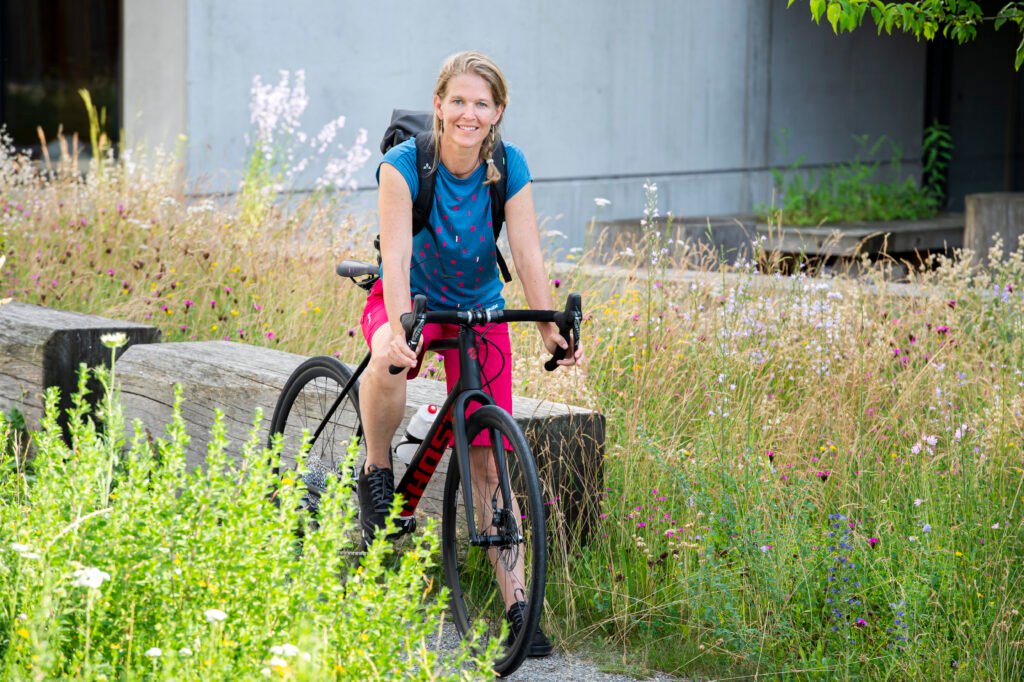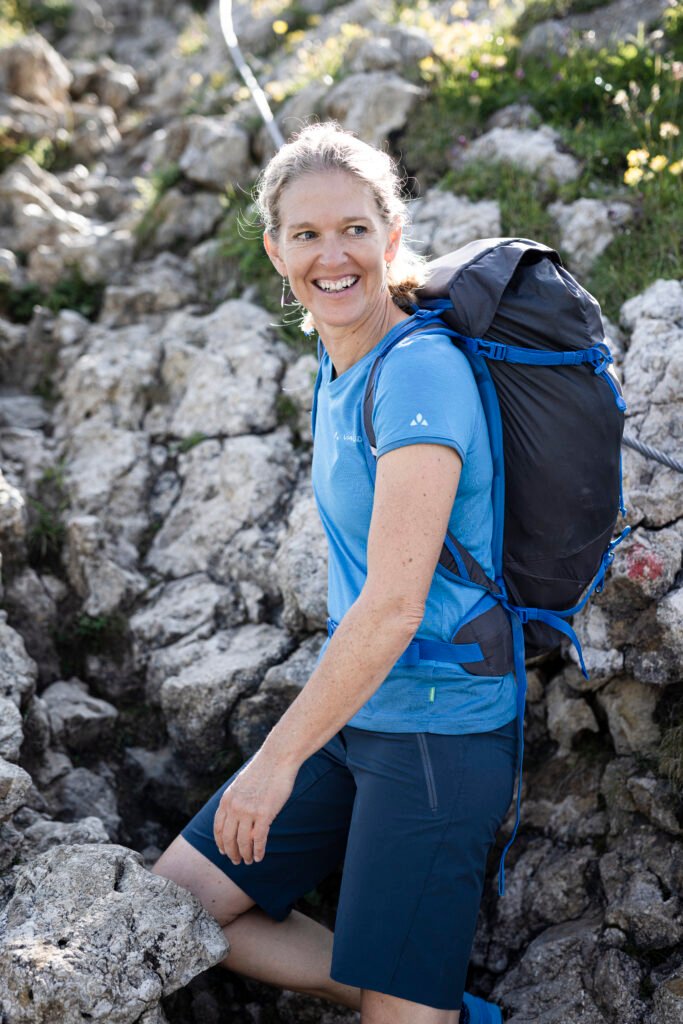10th April 2023
The Spokesmen Cycling Podcast
EPISODE 321: I Cycle Therefore I Am — Book Chat With Authors James Hibbard and Max Leonard
SPONSOR: Tern Bicycles
HOST: Carlton Reid
GUESTS: James Hibbard and Max Leonard
TOPICS: From highbrow psychedelia to being defined as a cyclist — discussing “The Art of Cycling: Philosophy, Meaning and a Life on Two Wheels” with author James Hibbard and blurb supplier and author Max Leonard.
TRANSCRIPT:
Carlton Reid 0:13
Welcome to Episode 326 of the spokesmen cycling podcast. This show was engineered on Monday, April the 10th 2023.
David Bernstein 0:28
The spokesmen cycling roundtable podcast is brought to you by Tern bicycles. The good people at Tern are committed to building bikes that are useful enough to ride every day, and dependable enough to carry the people you love. In other words, they make the kind of bikes that they want to ride. Tern has e bikes for every type of rider. Whether you’re commuting, taking your kids to school or even carrying another adult, visit www.ternbicycles.com. That’s t e r n bicycles.com to learn more.
Carlton Reid 1:03
I’m Carlton Reid and on today’s longer than usual show, one hour and 45 minutes, I talk with ex professional cyclist James Hibbard, author of The Art of cycling a lyrical book on philosophy and a life lived on two wheels. And joining me in a sort of tag team was fellow author Max Leonard, who supplied one of the blurbs for James’s wonderful book. I am honoured today to be joined by two authors, one of whom Max Leonard is actually on my timezone. So Hi Max, and whereabouts are you Max Today
Max Leonard 1:49
I am in sunny East London.
Carlton Reid 1:51
It’s sunny in Newcastle as well you know we’re living the dream here in the UK at the moment, not in the UK and not on our timezone. We have another author another cycling connected author because we’re all cycling connected authors here at James Hibbard. So hi there, James.
James Hibbard 2:09
How you doing Carlton? Very good to actually be on the podcast and it’s sunny as well in Northern California. Although that’s probably a little less funny than a less surprising than sun in the UK.
Carlton Reid 2:20
Now, people on this podcast, we have a frequent number of guests from Southern California who I always joke and say what’s the weather like there? Because I know it’s going to be you know, the worst that’s going to happen is they might have to put arm warmers on you know bad that literally is generally the worst they have to do
James Hibbard 2:37
up here it’s actually been a bit a bit bad Carlton it’s been bad in Northern California here it’s been like like rain like I never recall since childhood so it’s not it’s not always saw
Carlton Reid 2:49
you on I guess it Northern California is different isn’t because most of the guests who are regulars on here are Southern California. Oh, we’re gonna be do get more weather that we get a lot more
James Hibbard 2:58
and we’re going to be talking a lot hopefully about California. And yeah, I think we can dive into some of the big cultural differences
in fact, between southern and northern California when it comes to cycling culture, okay.
Carlton Reid 3:09
So at first I want to I want to because we’re going to be doing a tag team sort of here or a Madison you know, thrown off kind of thing here with with me and Max, we are going to be ganging up a little bit on on James and we will talk about it because it’s James as in effect, Second Edition, so paperback edition of his book, rather than that that first paperback hardback version of his book. But let’s get to max. First of all, Max, I’ve done numerous stories. Well, at least two on your Kickstarter books, including one of which I know you’re working on now on a famous California mechanic. So you can tell us about that. But can you first of all, tell us about you’ve done other books, you’ve done a kind of a cycling climbs book and what and why cyclists are attracted to going up against gravity. And you’ve also done a book about the last rider in a race I almost want to say lose it there. But of course the the person’s last in a bike race isn’t a loser at all. So to ground us on this this show by first of all, Max telling us about
Max Leonard 4:17
your books. Okay? Yes, my first in inverted commas. Proper book was called lanten Rouge, the last man in the Tour de France. And that really does exactly what it says on the tin. And the last guy in the tool was given the nickname the lantern Rouge. The Red Lantern, probably after the lantern that used to swing on the back of a on the back of a train to show the guard that every character has passed through. And I think it was a kind of underdog thing given by the fans. It was never an official Tour de France classification. They didn’t like it because they thought it you know celebs I did failure and it took the shine off the winner and took the focus off. But actually, I thought, you know, cycling is a nice road cycling is a team sport and you have all these other aspects to the story, you’ve got, you know, self self sacrifice. You’ve got, you know, working for your leader, you’ve got the teamwork aspect, you’ve got sort of horrendous injuries, you’ve got incredible stories of really great cyclists who’ve managed one way or another, to come last. So really, that was digging down into, you know, trying to subvert the ideas of success and failure. And, you know, take a look at what we mean when we think about those things. And, you know, for in a lot of ways, if cycling, cycling race is just a publicity game, then, you know, the last guy in the race gets a lot of publicity, then he’s really done done a dozen responses and, and guys use people used to hide a hide behind cars and you know, lose time deliberately to try and get last place.
Carlton Reid 6:04
Right, and then and then your gravity book.
Max Leonard 6:06
Yeah, well, it’s called a higher calling. And this is maybe where we’re getting kind of more into Joneses kind of territory, because high calling was was the subtitle is, cycling’s obsession with mountains. And, and that end is really trying to work out why we like going to the mountains and why we like doing something that’s so difficult in a way. And so that breaks down into a few different things you can say, Well, partly there’s the kind of, you know, competition thing. So I, I went to a mountain in the south of France, but the bonnet in the Alps, which is the highest mountain, the highest road passed in the Alps, or at least, that’s what the signs say, and how to try to dig into, you know, the kind of competition of Tour de France and the dirt Italia and all the beautiful history, but also the natural environment you’re in the kind of the training that goes into it, and people who are around there and and the history of the place, and all the different things that make mountains such sort of special obsession for cyclists.
Carlton Reid 7:12
And the Alps and mountains and bikes comes into the jobs Bradbrook really he was, he was a big champion of cycling in Europe, wasn’t he? Yeah, it
Max Leonard 7:23
gets Brian was he was a, a strange character, who I heard of, because he he he made what is the kind of the definitive text on wheel building, or at least it was back when people used to actually build wheels and not just buy them ready made it from a factory. And he was a California cyclists to kind of a mentor to people like Tom Ritchie and other frame builders in the area, and he died in 2015, I should say so. So if you were alive now he’d be he’d be 90 or so. And he wrote, he wrote in the Santa Cruz Mountains and the Sierra Nevada and all these amazing places in California and just took his road bike into the dirt in ways that people in the 50s and 60s 70s 80s just didn’t really do, I’m talking about before mountain biking, before mountain bikes were invented, and definitely before gravel bikes and all of that. But he also would come to the Alps every year for 50 years, and do kind of exactly the same route, or pretty much but depending on the weather, each time staying in the same places and taking pictures in the same place at the same place for 50 years in a row. And he left behind this amazing archive of photos and ride reports and stuff like that. And he was he was pretty influential and into it big in the bike industry to his own sort of weird outsider kind of way. So he he worked with a local company in California not far from where James is called avocets and came up with all sorts of stuff that they then put on the market
Carlton Reid 9:07
and local computers and and all sorts of things like that.
Max Leonard 9:11
Exactly. He was a was the guy who came up with the idea of riding trendless tires, which people thought was crazy when when he when he he proposed it and everyone else had some tread on it. He said you know he was a real kind of engineers engineer and he proved to Avocet and then to the rest of the industry that that be you got more traction from a from a trendless tire and that you can actually lean further at least you know if you’re talking about a perfect tarmacked road anyway so so yeah, he was really interesting guy and I remember seeing these photos of him years ago and being blown away by this. He was six foot five and so he had a bike frame that was about I think we had a 65 centimetre frame with a head tube as long as as long as my arm basically and There it is, then there’s pictures of him in the Alps on on gravel roads before they’re all tarmacs and just, you know, sort of expanded the idea of what cycling could be for me.
Carlton Reid 10:10
And what stage are you at with that? Because you you were successful in your Kickstarter. So what stage are you at now?
Max Leonard 10:15
We are just finalising the layouts and spreads and it goes to print in the next few weeks. So it is it. The hard work is almost done. But it’ll be a while till it’s out. It’ll be around in your sometime in the summer.
Carlton Reid 10:34
And then there’s, there’s a slight link there in that, you know, you’d unmade up roads, cycling in the Alps. Sunny cycling in the mountains, is a link to another one of your books, which is also kickstarted, which was like the rest of fellowship?
Max Leonard 10:51
Yeah, exactly. And probably the context of these these photo based books is I decided that I started a publishing company a few years ago, and have just by accident, I guess or by luck come across these amazing archives of photos and things. The rough stuff fellowship was, they’re known as the oldest, the world’s oldest off road bike club, founded in 1955, in a pub in Leinster, which is in Herefordshire, not far from the Welsh Welsh border. And that it seems funny to think about it, but back then the idea of off road, they call it rough stuff. And actually, the roads themselves can’t have been, you know, lots of them in very good quality at all. So the idea that they’d go off and seek the kind of byways and bridle paths and that kind of thing. Really set them aside from cycling of year and they would not, they’re very non competitive, it was all about camping and enjoying the outdoors and that kind of thing.
Carlton Reid 11:54
And also masochist, there’s an awful lot of masochism, there wasn’t that there was still like, you know, there were quite happy to walk up stuff, which was
Max Leonard 12:05
one of the founder members, he, his famous, infamous quote from him says, I never go for a walk without my bike. And so I think basically, that, you know, they just wanted to get out into the great outdoors. And you know, we’re happy pushing their bikes if if it meant that they could go across, you know, pass in the Lake District, or through a field or up on the walls or the Fells. And, again, they left behind this incredible, I say, left behind, the club is still going strong. But you know, over the past 50 6070 years, they’ve created an amazing archive of beautiful pictures of people carrying their bikes through fields, essentially.
Carlton Reid 12:48
So that masochism, and the outlier ism is definitely going to be picked out here when we’re talking to James because James is the author of and I’m going to just name the whole title here and it’s subhead, the art of cycling, philosophy, meaning and a life on two wheels. Now I’ve given before before we came on air here, I gave maxed, complete carte blanche to jump in whenever he wants to on this. But I have got a bunch of questions for James as we go through here, but I’m going to start by by by maybe describing before I even come up with the first question I kind of described because I’ve read James’s book is fascinating. It’s wonderful. I know it’s been shortlisted for a bunch of awards. And this as I said before, this is like the paperback edition that we’re talking about now, because the hardback clearly has been successful. And the publisher who’s the publisher,
James Hibbard 13:54
it’s quick, it’s in the UK and Pegasus in the United States, we’ll be publishing the hardback on May 2 of this year. So it’s the first American edition.
Carlton Reid 14:03
So I’ll just describe it to people. I mean, I want people to go out and buy of course and read it for themselves, but I’ll just give it a brief thumbnail sketch just kind of philosophy for Dummies, but we’ve added spandex. And then you’ve got this challenging three day ride with two of your fast mates. So you’ve got two, two former pro cyclists because you James, you’re from a pro cyclist in the US, right? So there’s this it’s this kind of interplay between the history, mostly of Western philosophical thought there’s some Eastern stuff, there’s certainly a fair bit of Zen stuff in there towards the end of it’s only Western stuff. Then it’s that it’s almost like why we cycle there’s a definite section there and that the pain and the suffering and the masochism definitely comes out there and then the kind of the almost the owner ism comm comes out there and how cycling attracts perhaps a certain kind of person. And but then you’ve got this, this, this, just it’s a narrative of how I’d like to say enjoyable, but of course it’s cycling. So it’s not enjoyable. It’s just something that you suffered with fellow riders. So there’s you leave your wife and your young child, and you go off and you haven’t written for a long time. And they’re 10 years, since you’d written
James Hibbard 15:32
at least 10 years since I’d written seriously. Yeah.
Carlton Reid 15:35
So it’s there’s a nice die certainly associate myself with that period of not riding and then getting back into because you’re like, basically training to go on a training ride, right? So there’s, there’s that huge segment of the book is power hub in Canada, but it’s probably the biggest segment of look is actually this narrative of this ride in California, with with with your your mate. So that’s basically what the book is about. It’s a very long book, very interesting and fascinating books. I’m not belittling, like there, but I’m kind of trying to precis it anyway. But first of all, because there are bits in there, that I’m when I’m reading this I know parts of where you are, because you’re Morgan Hill. Yes, indeed.
James Hibbard 16:20
So yeah, really a little bit south of San Jose is where I grew up. So that that gives you any
Carlton Reid 16:25
Morgan Hill is is um, you say in there, it’s like it’s saw the convergence of cycling and the counterculture and as soon as I read that, I thought of Gary Fisher. I thought of mountain biking I thought of Grateful Dead right and and their connection with cycling and then Morgan Hill of course, you have I’m sure you must all the time. When you go riding you must see Mike’s in yard. And and the specialised Indian riders who go out and suffer. Every lunchtime
James Hibbard 16:55
I did and actually spent some time working
working for specialised as well. So I know, I know, Mike. And certainly that whole sort of ecosystem that Max was alluding to, of really a counterculture meeting, cycling, is very much grounded in the Bay Area, the peninsula companies like Richie Avocet, specialised in Mike’s vineyard, Jim genties, and Jiro. So this whole sort of confluence of 1960s counterculture meets European road cycling. And and I think that that was certainly a pre Lance Armstrong era, and very much an era that that influenced me through my first club. And the shops owner, who I mentioned in the book named Terry Shaw. And this whole sort of ecosystem of looking at the Kony manual and juniors ride rollers in small gears, a very sort of, I think, lost lost art view of what the sport of cycling is, in a very sort of describing
Carlton Reid 18:05
the book. The coding manual is, yeah, SEO and I dot dot, dot, dot, dot, then in Italian, purely translated book, so but just tell people who don’t know what the coding manual is.
James Hibbard 18:16
So it’s this, when there was very, very little information on what European cyclists were doing. The Kony manual was a training manual that was translated from the Italian into English, and essentially, was the only sort of insight window into into how it was that that European cyclists were so much better than American cyclists, right, when there was this sort of continental European mystery about the sport, the sort of first insight in I believe, was the late 70s, that it first showed up in the United States. But this was the sort of of manual that that was up there with, okay, how does how to all the great Italians, how does even sort of great Belgian writers, how is this being done, and this the coney manual versus sort of proxy insight into European cycling at a time when there was this very, very little knowledge of what was was actually being done from a physiological perspective.
Carlton Reid 19:16
So just bringing Max back into this in that the reason I’ve connected you to is because I got a press release from from your publisher in the US asking me to, to write about this book, and I needed to go back and said, Well, yes, I’d like to get more information. But what jumped out at me of course, is that because I know Max, and Max is one of the names that’s on the blurb of your book, and he is on the press release. So it’s like oh, well, Max, I you know, I’ve been in you know, in rooms writing with Max in on the same publication. So let’s Max in here. So Max, what What is your connection? And you could even maybe even read out your blurb But you’ve said for for James But But what? What is your take on James’s book? Maybe you want to like maybe change my precis into a different precis?
Max Leonard 20:10
Oh gosh, well, I don’t have the blurb in front of me actually, I was I was searching high and low for my physical copy only, but I do have I do have the PDF, thankfully. So I managed to brush up on it again before coming on air but it’s just a coincidence that James and I are published by the same guys and in the States. But James wrote to me, I can’t remember when but you know, back when this before it was published in hardback and said, he really appreciate me giving it read and quiet and, and I did and while I gave it and read and I was just sort of enchanted by the way that it mixed together, the kind of personal story and the stuff that’s very grounded in in him and, and his his journey through through being a pro cyclist and became perhaps becoming a bit disillusioned with that and then picking up a biker gang and then going on this, this ride down the coast of California with the kind of wider things, you know, wider questions of life and bringing all these different philosophies into it and, you know, slotting names that I knew a bit of but not very much about, you know, Nietzsche Vidkun, Stein, Sartre, you a bit bit about Sartre actually, but but, you know, bringing them in and making them applicable both to cycling and into the kind of things that happen to you and your cycling, and whether that’s physical or emotional, or, or, you know, the kind of the pain that you’re talking, you’ve talked about Carlton already, but also, I think that I liked, particularly in the you know, I spent a while on a bike over the years, putting out different things and quite nice things about mountains and history and that sort of thing. I guess, but my higher calling book, you know, trying to ask the why of why we why we like mountains, that kind of thing. But one of the things I always thought about cycling was was that, you know, you know, you say I’m gonna get on my bike, and I’m gonna go out and, and think about something, maybe I’m stuck on something at work or something like that. And you got enough to two minutes, you don’t think about anything, you know, your brain has completely, completely wipes and then you come home, and then usually to me, it happens, I get in the shower, and then I suddenly have a brainwave. But but the idea of not thinking, I think is really super important. And that’s something that James comes to very quickly in the book and kind of explores, I don’t know what you think about that, James, with, there’s more more you can say about the kind of perverse attraction of not thinking?
James Hibbard 22:49
Well, I think, I mean, I keep sort of bringing it back to California culture. And I think what’s very interesting about the current cultural moment, that’s, that’s very California, but it’s very spread Absolutely, globally, is the sort of internet and this hyper rational belief that everything that can be accomplished, and the things that are most significant and most pressing, all have very tangible, rational answers, right? Where sort of what we’re talking about in terms of thinking is, in fact, price so highly in our in our current cultural moment. That what we’re talking about and trying to describe in terms of sort of using Zen or using Nietzsche or a figure like Heidegger, this idea of not thinking, because you’re so engaged in the physical world. And then the tangible is, I think, increasingly being lost by always being online and plugged in, and what tends to be valued things like writing code, or being productive. And I think that that while those are very, very important, and have certainly been emphasised, by 2500 years of Western philosophy, you’re losing a lot of what it is to be human by thinking that that is the only important experience of what it is to be alive. So I think that that the art of cycling could have been about playing the violin, it could have been about digging ditches, it could have been about chess, anything that just really pushes you back into the tangible world and not this world of rational abstraction.
Carlton Reid 24:30
That tangible world, which you describe in the book, and you talked about how cyclists are very much concentrating on the moment and and yes, as as Max was saying, you know, you almost think about very little, but when you’re what you don’t you don’t see cyclists generally on their phones, looking at screens, bringing it back to that, that that point you’re raising, right, but you do see motorists on this. Unfortunately, you see motorists on their, on their screens, very frequently, so there’s something about cycling and not just the fact you’re on skinny tires. And if you crash, you’re gonna hurt yourself, there’s potentially something more about cycling, the VIS serial aspect of cycling, that where you you’re really not enveloped by anything right very close to nature in a way that you know, even a sports car, a driver of a sports car is not connected to nature in that way. So what is it about cycling that makes you not be attached to your screen? Whereas in a car, you are you potentially you want to be attached to a screen. So because you think it’s so boring that you can just do it without having to pay attention?
James Hibbard 25:39
Well, I think I think if you you think through let’s go back to car. I mean, you’re absolutely right. But let’s go back and not lumped cars all together, let’s think about 1960s MG with a manual transmission being driven on a mountain road with a convertible, right, that’s the sort of one spectrum of driving an automobile. Another would be driving a Tesla down Highway 101. In California, right, you’re completely isolated, you’re your temperature controlled everything else. along that spectrum. I think that what’s what’s interesting to think about is this idea of how mediated it is, right your your experience in your interface with the automobile and, and hence with the road. So in one instance, you’ve got a manual transmission, and you’re trying to sort of feel through the gearshift, you’re having to sense what’s going on on the road surface. And that’s coming through direct actual mechanical interfaces rather than some computer system. So I think that that you just keep on that spectrum in terms of things either being mediated through different computer interfaces or not. And the bicycle is, of course, even less mediated than even a bike with di two and electronic shifting is less mediated than, for example, that mg. So I think that the amount of feedback that you’re getting from the environment, and whether that feedback is direct, or run through some other system to make it ostensibly easier to control or handle, is really the the way to start to think through that this idea of mediation, I think is huge when you’re operating a vehicle that’s hurtling through space, what that vehicle is telling you and how.
Carlton Reid 27:34
Because you make the point in the book about how you know speed, we all like speed, cyclists don’t like speed and logic like speed, but it’s not in the real world, you know, we are very often going very fast in our car, in an aeroplane or whatever. But we’re divorced from that, right. Whereas on a bicycle, you’re not divorced from that speed, you you’re potentially in spandex. You are that you as you say the two square centimetres of rubber is, you know, you’re gonna hurt yourself, if you fall off, or if you get in a car, you seem as though you’re going to ride 70 miles now I’ll survive that.
James Hibbard 28:07
Right? Right, the lack of of feeling that there’s consequences in a car is certainly different than, than when you’re on a bike. I mean, you you sort of 35 miles an hour on the descent feels like 85 miles an hour easily in an automobile. So yeah, this sort of sense of existential threat and consequences is on a bike is massively different than, than that of being in a car, particularly being in a modern, modern car with air conditioning and everything else. You’re just you’re, as you say, absolutely divorced from the environment in a way that you’re not. You’re certainly not ever on a bicycle.
Carlton Reid 28:51
And you make a good point. I hadn’t actually thought of this before about why, you know, people might say the pros, preferred tubular tires. And you’re describing that very well. And you’d like two or three paragraphs of it, just it just you feel the curve. You feel everything much more because of that particular profile. Right. And I hadn’t really thought of it in that way before. It’s like, yes, you should, is daft to have a tubular tie for all sorts of reasons. But you just described as like, yes, but the feeling you get from a tubular tie is unlike the control you feel you have, right.
James Hibbard 29:27
I mean, it’s just to sort of illustrate I mean, a tubular tire has a round profile that’s glued to the rim, whereas a clincher has a U shape. And you can just sort of think as you’re leaning a bicycle over, having a very consistent round profile as the bike is is leaned over to a greater and greater extent as opposed to a U shape is hugely advantageous to just have a sense for you’re not you don’t have a changing profile along with the change in the angle of the lean of the bicycle. which is a massive advantage. And yeah, I mean, I love the feel of a beautiful Italian made tubular like nothing else. The way it rolls over pavement and just resonates. Max, what
Carlton Reid 30:12
do you what are you writing on? Was did that resonate with you? Is that the were you like nodding your head heading? Oh yeah, I’m at my tubeless this afternoon. Are you? Are you a tubular rider? Are you a clincher rider? Are you a gravel bike? You want the fatter? What are you?
Max Leonard 30:28
I’m just trying to think I don’t think I’ve ever written a to the tire. Unless it was on a higher bike a track bike somewhere. But no, I’ve only ever had. clinches and latterly on my gravel bike, I’ve got tubeless but no, I, I mainly ride a what was it a kind of pretty traditional steel framed road bike with with rim brakes and you know, everything tried and tested and it’s a it’s a nice it’s a new frame and it’s stainless steel and it’s a it’s it’s pretty advanced in a lot of ways but but that’s my main ride and then I do have a gravel bike. So that’s that’s tubeless and that has squirted gunk on me all difficult situations when I would have preferred to mate well, when I’ve had to put a tube in and, and deal with it like that. So far out in the world. There was nothing else to do. But um,
Carlton Reid 31:29
so as any one of us on this podcast is a is a tubular fan. I’m with you there, Max, I’m not writing to you.
James Hibbard 31:36
They’re a royal pain. So there’s no there’s no in many ways they’re they’re indefensible.
Max Leonard 31:42
It’s funny, I don’t I don’t know when high end clinches came in, in the USA because working on this Yoast Brand Book has has it when he was writing right the way through the 60s in the 70s he would be taking his his road bike out onto the dirt roads of the Santa Cruz Mountains with tubular tires and and then every Wednesday they’d have they’d call them patching parties. So everyone and they’d have they’d have like an assembly line of people doing jobs because to men that cheapen the tires, because obviously, you know, you’re pretty likely to get flat if you take a road bike out onto a dirt or gravel or rocky, rocky road but but I think the rough stuff fellowship who also like to take their bikes on suitable places, they always look to be riding them to be riding clinches with an inner tube. So maybe it was just the hot kind of higher end of clinches that didn’t come through in the States or maybe they’re just a different culture.
James Hibbard 32:47
Yeah, I think it was really a higher end closers that didn’t show up until about 2003 2004. To be honest, I mean, anything that one would want to race on. I mean, I remember it being very late for higher end clinchers. And that used to be a situation where, yeah, train on clinchers race on tubulars was sort of the, the go to through I’d say about like, man, like 2004 2005 I did it pretty late.
Carlton Reid 33:14
So So James, I want to I want to drag this back to your book, and I will drag us back to philosophy, even. But I want to start I mean, because because there is I’m gonna I absolutely want to get in and there is depression in your book. There’s suicides in your family in your book, and I absolutely don’t want to to not talk about them because they’re important parts of your book. But I’d like to talk about something that I don’t even even know how much you’re paying attention to this but as a former pro I’m guessing you must have at least a thought on this. So you talk about Lance Armstrong era in your book obviously and the doping parts of it but that that era you know famously and you describe the Moser the our record where you almost like date the how technology took over cycling your data from like the Moser, our successful beating the max record. But the Lance Armstrong era is when when I think what most people recognise that really has come to its absolute peak. When it’s very regimented. It’s fixated on equipment there’s there’s there’s doping. Oh, martyrs. There’s Mod all these sorts of marginal gains, you know, with which again with the sky team took to it instead of, but we’re now in the era, a different era. We’re in the era of pocket char. Who’s a throwback to mercs that riding on gut instinct and pain and strength. You know, the blood and guts kind of writing that maybe you grew up on because you in your book, you describe it about how much you you grew up on that kind of European fantasy of nine Tene 50s cycling, so I’m not going to bring into the into the philosophical realm. So my question is, is pocket char, if you are paying attention to to his feats right now, which are just super, super dominant. So is he an example of nature’s own image, not the Superman, as you quite rightly point out in your book, but overmatch
James Hibbard 35:25
that there’s certainly athletes that fall into the category. I’ve I think that as I’ve moved away from sport, I’ve become a little bit more measured in terms of an athlete’s ability to fully sort of fulfil. Nietzsche has overmatch category, I think that that there has to be a measure of of artistry in it as well. And I think that poker chart comes close on that front, I think that only time will tell sort of what, if anything, is is fully legitimate. And I still worry a little bit about that in the back of my mind about the sport. So I’m, that’s why I’m a little bit guarded. But certainly his sort of style of racing, I think, is refreshing, and absolutely good for the sport. As opposed to sort of what we were talking about, and what you alluded to the sort of sky Armstrong, not just not merely the doping, but as you mentioned, a very sort of marginal gains obsessive approach to the sport that makes for very boring viewership or not emotional racing, sort of just a game of power metres and attrition. So I think that that he’s absolutely closer to this sort of Nietzsche and ideal. But sort of given my distance to the sport, I always remain a bit a bit sceptical, and these things take as we’ve seen, not just the years, but sometimes decades to fully come out. So I think the the jury is still out a little bit to be
Max Leonard 37:03
honest, it’s very, it must be very difficult being being like a, like a sort of mid or late career pro cyclist at the moment, if you’re, let’s say, you’re like 28, or, or 30. Right? Because Because, because like because there’s this new generation of just totally come and blown everything away. And it’s like, they basically they have let anyone else have a chance and Pikachu is is obviously one of them. And but you know, you there’s Evan pool as well, right, even Tom Pidcock there’s just guys that seems, you know, pretty neat other level and kind of training and stuff that they do is,
James Hibbard 37:46
yeah, there’s a whole there’s a whole group of guys about a five to eight year age band that just appear to have been totally leapfrogged over. I mean, we went from like, yeah, Valverde to
Carlton Reid 37:57
pokitto.
James Hibbard 37:59
With with I don’t I don’t know the math off the top of my head for birth years there. But it there’s there’s a sort of a big, big, I’m being a bit hyperbolic there. But a pretty big goals in terms of, as you mentioned, Max, yeah, guys that are 28 to 3435, who just apparently that that generation just didn’t have the the talent and bubble that you see for, for some of the younger guys,
Carlton Reid 38:24
that probably just doesn’t seem to have a troubled background. So it’s relatively reasonably famous that, you know, the best athletes, or the perhaps the best entrepreneurs, the best of everything, tend to have some sort of damaged, family background, personal background, and that’s what makes them strive. Is that something that you recognise, James, is that something that?
James Hibbard 38:50
I think? Yeah, I think that I think it’s a double edged sword. I mean, I think that certainly a sort of troubled background driving someone’s succeed, properly can can sort of be spun into fuel. And, but I think there’s a razor thin line in terms of that fuel turning self destructive. So I think that that for some number of people, it works and some number of successful athletes, it works at least for a given period. But then I think that there’s there’s also I recall seeing years ago, and obviously this is extra convoluted by the matter of, of doping, but some East German studies about the psychological profiles of elite athletes, that sort of just found almost the opposite, that being calm, level headed, good family background, able to deal with setbacks. Well all of these sort of pretty straight laced psychological profiles actually succeed as professional athletes at a higher rate than the sort of pro Both characters who might turn bad childhoods or ill psychological health into results in their given sport. So I think that that’s a definite double edged sword.
Max Leonard 40:12
It’s an interesting one because I had a guy speak recently cool them think he’s a doctor Dr. Lou Hardy, Professor Lee Hardy. He’s a climber and as it was a became a top level sports psychologist and he was part of various studies where he was where he made it made a distinction between, quote unquote, normal Olympians ie those who just, you know, maybe get a bronze medal or maybe even a gold but don’t do it over and over again. And and the kind of multiple med medalists the people who produce and who, who outstrip up their own achievements year after year. And and his his conclusion was that yes, there was this kind of element in, in, in a lot of their parts, there’s a common element of having a really a troubled childhood or some kind of, you know, something missing that they were trying to make up for.
James Hibbard 41:12
I think that that’s an interesting distinction, I think makes sense. I mean, you can think of, for example, the American swimmer, Michael Phelps, who has been very candid about some mental health struggles after his retirement certainly fits that that category of super Olympian. So I think that that distinction seems super interesting to me, Max and spot on, as you sort of run through the laundry list of
Carlton Reid 41:39
James. That’s that at that point, because in your book, you’re very open about the depression. Yeah. And the mental health issues you went through. So again, without wishing to spoil the whole book, were you to this? Can you just summarise it? And talk about what you you mentioned in the book? And also, was the book cathartic for you? So did it actually help your mental health? writing it?
James Hibbard 42:12
So it’s a tackle that one tackling that one? First? I would say? Probably not. I think that that there’s this idea in terms of writing that.
I think perhaps writing that is not for public consumption. Can can be cathartic. But I think that when one is writing with the idea of the knowledge, contract sign, things like this, that a book is going to be consumed publicly. I think that there’s an entirely different mindset that a writer brings to it. And you have to move away from personal, perhaps indulgent catharsis, to sort of hopefully artistic success and something that’s pleasurable for a reader. So it ended up for me definitely, unfortunately, not being cathartic. But in terms of in terms of sort of general mental health, and the way I’ve thought about it and approached it. I think that the two, the two things that I’ve pursued very vigorously my life have been cycling and philosophy, where I certainly had the idea that I was going to be an academic philosopher for a time. And I think that both of those things, in retrospect, I was trying to outrun a lot of my own demons, and it’s difficult to tell the extent to which those demons are situational or environmental or genetic. As you mentioned, there certainly is a history of depression and suicide that runs through my family. And I think that that one one is struggling with mental health. Everyone is familiar with with Rene Descartes and this idea of Cartesian Dualism, and you certainly run into that on a minute by minute basis when you’re really struggling with with depression, you sort of think well, is this owing to some genetic predisposition constitution and the way certain neural chemicals are being taken up in my synapses? Or is this something that that I can think or snap my way out of? And, and, unfortunately, the snap my way out approach, as ridiculous as it sounds, to any sort of person who’s suffered with depression or mental health, there’s an odd temptation to it. And you can sort of think that, geez, if I just try harder, there’s some way out of this thing. And it’s, it’s a very tricky, bizarre thing to navigate. And I think for me that the thought was for me Initially, if I’m just a successful enough athlete, everything will feel better. And there’s something very tempting about having depression, having anxiety, and going and riding your bike for five hours and a difficult training session, you’re just exhausted, you’re no longer anxious, you’re no longer depressed. So I think that that the sort of obsessive nature and the striving of sport sort of kicked the ball of my mental health challenges from the first sort of, I confronted in my my late teens, kicked at much, much later. And then I saw some of those answers in the same things and philosophy thinking that boy, if I if I merely understand things, things are going to be different in my mind, and my outlook is going to be entirely changed. If I somehow grasp philosopher XYZ in some fundamental way, this will shift my my brain and hence my relationship to the world and in a very basic way that will be beneficial. And the the gist of the book is, both of those don’t work well.
Carlton Reid 46:10
You describe that very well, in the book, and you’ve certainly got a background that I didn’t have, in that you seem to have conversations with your parents and your father about sugar from a very early age your father, you can’t see any cycling background to the rest of your family. philosophy comes very much from your your father’s you are having deep conversations, and it seems from like 10 years old, with your father on philosophy, but is that right in saying your cycling is a disconnect with your family, but of course, the philosophy has come from your phone.
James Hibbard 46:48
Yeah, there’s more definitely more familial continuity with philosophy. My father studied philosophy under a relatively renowned Heidegger scholar in the 60s who came from Germany at Stanford. So very much a familial connection to particularly German philosophy through my father. And generally the fact that he was around the sort of Bay Area 1960s counterculture where this sort of whole idea of not just philosophy but philosophy, changing your mind and changing your perceptions, right, this sort of can Kizzy Timothy Leary, guided ideal of what thinking could do. And that reality,
Carlton Reid 47:35
as well. Yeah. Not just
James Hibbard 47:37
not just thinking but yeah, absolutely. Yes. bound up with with with psychedelic drugs and but sort of what I was exposed to it was a sort of, I suppose high brow psychedelia. Where, where? Yes, certainly, like drugs were discussed, but sort of in service of reality, not being what it appears on the face of it. And in retrospect, I’m not sure how useful this is to convey to to kids, to be honest.
Carlton Reid 48:12
But you see, you’ve come from a milieu which discussed drugs. Yeah, I’m not saying you took LSD, or your family took LSD. And then you went into a sport that was famously certainly in the era that you were in and you were disgusted. Yeah. That you’ve seen discussed that frequently. Not just in your own book, but forward. Other books, right. The Paul Kimmage book, right. So there’s drugs have suffused both parts of your world potentially and you haven’t partaken of either.
James Hibbard 48:43
That’s funny. I’ve never really connected the two to be honest. I’ve always thought of, I guess just performance enhancing drugs just being on a different planet than then sort of anything psychedelic
Carlton Reid 48:57
Mind Mind enhancing drugs. Yeah. So what is body? Mind enhancing?
James Hibbard 49:03
Yeah, I just, I honestly, never really thought of them in the same sentence. And yeah, to be candid to begin, and like, while I was a teenager, I did with a good high school friend
took psilocybin and thought it was very interesting, thought that it was nothing I needed to return to continually it was not the I don’t know if you’re familiar, I mentioned Alan Watts, the sort of English popularizer of Zen, who had a long standing Barry of radio programme. He sort of, there’s a quote from him that I always remember when it comes to psychedelic drugs which was you know, once you get the phone call, you hang up you sort of have this experience, you realise that that reality is not constituted as the way your your teachers and your mentors and your parents and and the sort of local Lions Club would How do you believe If and then you take that information and live differently and hopefully better in a more sincere way than then everyone going to a nine to five job. And that was the sort of message that that I’ve received not only growing up, but also was was the one that permeated the cycling culture that I found.
Max Leonard 50:19
I think that’s really interesting, because because I think that the sense that you get, at least partly in in the US is that cycling is a is a kind of rebellion, isn’t it, it’s kind of against the, against car culture. And it was a very much a subculture for a long time. And from what I’ve read, and people I’ve spoken to, you know, Northern California was, you know, a kind of hotbed of, of cycling, and in a country that didn’t much care about it for for a long, long, long time. And, but I you know, I went to Palo Alto, which is not far away from where you are, last year to talk, guys and, and just as, it’s kind of, like, magical, and you’ve got these amazing mountains, and it’s beautiful, and like, like we’ve seen the sun shines most of the time. And then you’ve got these, you know, you’ve got the kind of rebels of cycling you’ve got the Gary Fisher’s and the and the Tom Richards and Joe breezes and Charlie Cunningham of the guys who invented a new thing and had like, kind of amazing attitude that comes through in New York, that part of California and so many different ways, but I was Why do you think cycling and and you’re a part of California and has been such a fruitful kind of thing?
James Hibbard 51:36
What is it? First of all, I think it’s very much changed. I mean, I think that that that sort of counterculture was allowed to flourish before Google and Apple and and sort of the financial pressures have come to dominate the Bay Area and the Santa Clara Valley and Palo Alto. Now to such an extent that I think that sort of counterculture is is really being greatly squelched. So I think that was, first of all, a sort of cultural snapshot moment from, say, the 50s, through perhaps the early 90s, if you’re being generous. But I think that the reason that that, that that confluence of factors allowed for cycling to be the sort of counterculture thing was, first of all, the the number of universities that are very close proximity. There’s Stanford University, obviously, in Palo Alto, University of California at Santa Cruz, UC Berkeley, San Jose State. So there’s a huge clustering of of universities and the sort of energy that comes from young people in universities and the counterculture. And I think that going back to psychedelic drugs, there were even a lot of government experiments about the usages of the usage of LSD for more nefarious purposes. Those were done at the Palo Alto VA. People like Ken kz, were very famously involved in some of those experiments. So going back to colleges, I don’t know if if this is the case in the UK, but almost all psych experiments throughout the 20th century were done on college undergraduates, including psychedelic drugs by the US government. So I think that that’s an interesting compounding historical factor that drove some of this.
Carlton Reid 53:40
And interestingly, the Yes, Max, the absolutely the amazing cycling culture of the Bay Area is just Yes, it’s amazing. But you’ve also got almost counter to that, in that Palo Alto, is the home of vehicular cycling. So John Forrester, that’s where he was was nabbed for cycling on the sidewalk at one point, which then leads to a huge movement of, you know, rejecting bike paths, you know, for for a good time in America. And you could almost argue that America or that that part of America has given Yes, and mountain biking and counterculture of cycling, but it’s also given you 2030 years of not going down the Dutch route and not asking for bike paths because we’re policemen pulling over a cyclist John Forrester in Palo Alto.
Max Leonard 54:37
Interesting, interested know that I didn’t know that.
James Hibbard 54:40
I didn’t know that either. It I’m not I’m not surprised, though, in a lot of ways, because I do think that what’s what’s difficult to pin down, I suppose about any complex intellectual problem or cultural area, but the number of sort of competing threads and To weird enigmatic things where you try and sort of pin something down as being bike friendly hub. And then you have an example like that sort of pushing all against it. And I think that that those sort of enigmas are throughout the the Bay Area’s DNA in a lot of ways.
Carlton Reid 55:20
I guess because you’ve got, yeah, you’ve got both pro and con there at the same time, because it’s such a rabid bicycling culture, you’re gonna get both sides of it. And at this, at this juncture, I would like to cut for an ad break. So I’m gonna go across to my colleague, David, who also happens to be in America.
David Bernstein 55:36
Hello, everyone. This is David from the Fredcast. And of course, the spokesmen. And I’m here once again to tell you that this podcast is brought to you by Tern bicycles, the good people at Tern build bikes that make it easier for you to replace car trips with bike trips. Part of that is being committed to designing useful bikes that are also fun to ride. But an even greater priority for Tern, is to make sure that your ride is safe, and worryfree. And that’s why turn works with industry leading third party testing labs like E FB, E, and builds it bikes around Bosch ebike systems, which are UL certified for both electric and fire safety. So before you even zip off on your Tern, fully loaded, and perhaps with a loved one behind, you can be sure that the bike has been tested to handle the extra stresses on the frame, and the rigours of the road. For more information, visit www.ternbicycles.com to learn more. And now back to the spokesmen.
Carlton Reid 56:47
And we are back had Thanks, David. We are back with James Hibbard, author of a philosophy book, a cycling book, a book about a nice trip with his mates, going to almost credit card touring because you sent your your your stuff ahead and you you didn’t carry stuff on your bike. So you sent stuff ahead, James. And we also had Max Leonard, who as we heard in the intro is an author of a goodly number of fantastic books on a wide range of very Catholic interest you’ve got on cycling, I can’t even think about thread that pulls them all together. James, I want to because we’re talking about your book is is philosophy book. Nietzsche is probably one of the philosophers that may be cyclists, if not understand, the most certainly quote the most because you know that that quote, the famous quote, you know, what doesn’t kill you makes you stronger? Well, that’s that’s a Nietzsche, quote, to link it to max. Nietzsche, of course, also loved suffering in the high mountains, so that there’s that kind of link. But Nietzsche was also appropriated by the Nazis and not his fault, but he was appropriated by the Nazis. So maybe he’s not the best feller for cyclists to follow. After all, I give, give, give the maybe the positive sides of Nietzsche, and why we should discuss Nietzsche.
James Hibbard 58:16
So I think the positive sides of Nietzsche are immense. I think that that his Nazi appropriation was very unfortunate. And he’s someone who’s easily appropriated owing to his style. You sort of thumb through Nietzsche and you can you find some examples certainly have his anti anti semitism. And in fact, his concerns about Germans in Germany. So Nietzsche is an interesting character on that front. But where where I think Nietzsche is truly fascinating is when you look through the history, and the sort of thrust of 2500 years of Western philosophy. It’s increasingly from Plato on driven by this idea of abstraction. So you walk into any sort of intro to philosophy class, and when Plato or Platonism is explained, it’s essentially like, Hey, you can have a table, this table here in front of us, the professor knocks on and touches, is going to eventually rot and decay and go back Ashes to ashes, dust to dust, but the idea of a table is solid and everlasting and immutable, and beautiful in a way that any actual table never is. So you end up with ideas and concepts being more important, and in some ways, more quote, unquote, real than an actual table. And I think what’s very interesting is this is allowed I would for tremendous success and scientific progress, because you’re dealing with with concepts. But implicit in that is also a sort of denial of things that are that are nearest tangible, actual things, actual tables made of wood in front of you. And you can see this same sort of, of tendency, certainly in Silicon Valley. So I think that this idea that philosophy doesn’t matter or some silly, useless discipline is is just on the face of it not true, you can see that that idea is in fact, massively important to this day, this idea of the abstract and intangible mattering more than the tangible so we’re Nietzsche comes into this is Nietzsche diagnosis this right at the at the end of the 19th. Nietzsche just to orient everyone who might not be the sort of familiar Nietzsche dies, and very symbolically in the year 1900. So Nietzsche sort of sees the end of famously not only declares God dead, this sort of Judeo Christian, true belief in God, but also senses that this platonic Christian denying of the world and of bodies is is an incredibly dangerous tactic. And in fact, one that is the hallmark of, of modernity. So I think that that Nietzsche is interesting for for a number of reasons. But that is really the crux of where I wanted to engage Nietzsche, this, this desire to what he do what he calls overcome metaphysics, overcome this idea to that, that the abstract matters more than the tangible. So cycling is tied in here and as much as it’s clearly a very tangible thing to do. And, and a very Nietzsche and thing to do and as much as demands presence. It demands a tangible visceral engagement, rather than an abstract one.
Carlton Reid 1:02:11
They don’t get on a bike, because he would have liked bikes, wouldn’t he? I mean, if he died in 1900, How old was he died about he died,
James Hibbard 1:02:20
he died relatively young and was in a sanitarium. He famously debated what what took place with him, but he spent the last the last decade of his life in the sanitarium under the essential conservatorship of his sister, Elizabeth, so
Carlton Reid 1:02:38
I’m just I’m just trying to roughly black out but he must have been
James Hibbard 1:02:40
he certainly saw I’m sure he saw early bicycles, but I don’t think there’s any evidence that he actually ever rode one.
Carlton Reid 1:02:49
His is because if he’d been frightened the right time to be it’d been 30 years old. Yeah, roughly, ya know, when when bicycles first came on the scene, so he he would have been right before getting on, he wouldn’t be surprised. He hasn’t. He
James Hibbard 1:03:01
was in ill health, he had poor eyesight, he had poor digestion. So I think that’s the other interesting thing autobiographically, about Nietzsche, is that for all of his talk about sort of virility and physical strength, he was, in fact, a relatively sickly individual from from the time he was a professor. And that’s why he left his professorship in fact, was just poor physical health, sort of going from from one spot in southern Europe to another sort of looking for better air or general recuperation
Carlton Reid 1:03:41
mountain air.
James Hibbard 1:03:41
Exactly.
Max Leonard 1:03:43
He was a big aficionado of the mountains wasn’t a and and a big Walker, I think I think he was very much embodied in that sense is that he you know, walking and thinking were quite well interconnected for him
James Hibbard 1:03:57
walking, thinking, hiking, all all of that. So certainly, yes, fresh air, physic Alpine physicality, we’re, we’re, it’s all sprinkled throughout his writings. There’s also
Max Leonard 1:04:09
the kind of, I didn’t know much about Nietzsche before I read James’s book. But you know, he’s a kind of easy caricature as well. And there’s a re cycling sort of element to it. Like, I’m just I’m thinking about Henri de Mirage, the guy who started the Tour de France, and this idea of of, you know, surpassing yourself and going beyond your abilities and the Tour de France, the first sort of the ideal race is something often quoted by Henri de grandes because I’ve never found the actual quote so it could just be apocryphal but the perfect order France be one where only one guy crosses the finish line, you know, that is stripped away everyone else and everyone else has fallen by the wayside and you know, expired because they’re, they’re not strong enough, and there’s this one sort of thing. Uber men’s guy is gonna it’s gonna win. I think it’s obviously kind of caricaturing and you know, using the, the perception of Nietzsche that without actually knowing much about him, but I think it’s all quite feels quite relevant and close, doesn’t it to a certain attitude? It’s like,
James Hibbard 1:05:20
No, I think it certainly does. And I think that that it’s funny, I mean, the, from the Tour de France to sixth day racing to sort of, I’ve heard about, you know, dance contests that go on for 72 hours straight or something, it seemed like, like it was in the air in that era, this sort of whole going to one’s absolute physical limit, physical exhaustion, these sort of feats of endurance. And yeah, I couldn’t agree more Max in terms of them being very, sort of self overcoming, Nietzsche in. And I think that’s what’s key to understanding Nietzsche, I think it’s easy to read Nietzsche, poorly, and sort of think that it’s this sort of outward process of winning or beating other people or succeeding as a capitalist or something, something awful like that. But for Nietzsche, it’s very artistic and very self overcoming as opposed to beating out a system.
Carlton Reid 1:06:26
And then you mentioned in your book, James about the style and his style was important to Nietzsche, they managed to define what he meant by style.
James Hibbard 1:06:35
So I think that what he means by style is very much what we’re talking about in terms of not just doing something on a sort of external basis, not merely succeeding, not merely looking at your your power metre and winning l’Alpe d’Huez, but rather attacking with one kg to go doggedly after having been dropped and then winning. Right. It’s, it’s, it’s sort of how something is done that matters to him. Because you’re taking your own will and imposing it upon yourself. So I think,
Carlton Reid 1:07:12
isn’t there like a, sorry, isn’t there like a quiet, you just described this in the book as well, there’s this, there’s quite a lot of, you know, underdog stuff in cycling, and the person who comes second is actually more important, more famous and more lauded in cycling than the person who comes first by pure, you know, skill. It’s the one who strive and fail, right, so the failure is quite a big thing in cycling.
James Hibbard 1:07:40
I think that maths can speak to this too, from from his first lantern Rouge book, and as much as I think that there’s, there’s something very French to say about that, about not, not respecting, not being obsessed with just the winner, but the sort of perennial second place, even the the final finish are in the Tour de France, and sort of really respecting that. And I think that there’s something that perhaps Max can even speak to that is very intrinsic to French culture, and French racing, cycling culture around that. I mean, it seems like there’s a perennial Tour de France contender who never quite succeeds who’s always French.
So I think there’s something culturally to that
Max Leonard 1:08:30
that’s that’s funny. I hadn’t thought of that but I can see I think you’re right and you know, the most recent example would be Tebow Pino and well and that the poor guy was never really given a chance he was so over it’s such such a passion there you know in French cycling style gets so much energy exposure and pressure heaped upon them I think and and you’re right for every for every jacket on Catia. There’s there’s a Roman Pulido who is the eternal secondaries coming on behind him and the US for lunch and Rouge it I don’t know how that how it really happened it I think it was a sort of spontaneous I think the underdog feeling is is pretty is British as well, I think we’d go for the underdog whereas in in the in the US I think might be sort of more straightforwardly rooting for for the winner but but in Britain we like the underdog in France. The lantern roof definitely came about in the first 10 years of the tour. So it happened pretty quickly. It was it was pretty much there before world war one as far as I can tell, though, I haven’t found the first reference to it in print. But the French public really took it took it to heart They you know, they would make a Red Lantern and give it to the rider for the last stage into Paris and the carrot or the carrot along with his teammates would hang it over his head
Carlton Reid 1:10:10
so it was it was it always proudly from from the from the get go so it wasn’t like a shame mark of shame it was I’m carrying this proudly was that early
Max Leonard 1:10:19
know it from it seems so and and then sort of post Second World War you’d get with the kind of explosion in not just cycling media but all media you know with with the with the kind of mirrors sprint and those kind of picture magazines and then the radio and then TV with with media and with the sponsorship that came in the last guy it would would become quite famous and he’d get invited to all the post tour. criteriums. So, you know, these, were talking about a time and you know, the Domestique the team riders would be making really, really terrible money compared with the champions or even with a, you know, anyone else and so they’d get to earn you know, maybe their whole year salary in a couple of weeks after the tour or you know, or more than that. So, so it became very attractive and it became it became identity I didn’t never know completely positive feelings about it ever and left definitely people that felt ashamed come last but but you know, on the other hand, that say you’ve got a guy who, who, thinking in 1993, a guy called Jackie do wrong, who won the Tour of Flanders in an incredibly long break, which that was his his main major achievement in his career. But then he became lanten Rouge in 1993. After a terrible, terrible crash in I think it was stage three, and was fighting along injured and it became became a matter of pride. But he stayed in the race and, you know, pushed on to the end. And actually, he was a sort of very mercurial character always attacking and he got the the convertibility prize as well. So in that particular year, the lantern rouge, the last guy in the race got to stand on the podium at the Sean’s Elisa alongside none other than Lance Armstrong. Yeah, I think it’s in for the French public as well, I think the French, you know, proletariat always had a, you know, stick when I put the government or the you know, the rule is the authority is that kind of thing. So I think there might be an element of that, and it take
James Hibbard 1:12:46
well, and I do think it’s interesting, I think you hit the nail on the head Max in terms of, of American culture, as opposed to either British or French culture on this front. And I mean, we sort of keep, we keep dancing around it to some degree. But I think that what’s what’s very interesting is the way the sport changed, not just in the Bay Area, but sort of demographically, in a post Armstrong era. I mean, the sport went from what we’re talking about, sort of in Northern California to being the sort of from being this sort of counterculture exercise, too. I’ve heard cycling described as the new golf amongst like venture capitalists in in Palo Alto, and things like that. So I think it very much changed. And I think there was a particular cultural moment, that was far larger than cycling, that you can sort of put the Armstrong era under the heading of write you sort of, I think, now with a little bit of distance, we can think and reflect back about not just someone like Armstrong, but a general, let’s say from, you know, the late 90s through arbitrarily here or something like 2005 2010, this sort of Nike driven, when it all costs Bernie Madoff type, cultural moment. That was perhaps American lead, but certainly global. It and I think that that’s an interesting way to start to think about the Armstrong era, in a perspective that transcend cycling,
Carlton Reid 1:14:24
because in your book, Jamie, you mentioned that the biggest insult, you could say to an American, is it you’re a loser. Absolutely. That’s that’s like, and that brings like the Trump thing, you know, when when he says, you know, you’re a loser, that that’s where that’s coming from that there’s a very loaded term, whereas what we’re discussing before about you can be the loser you can be the lantern Rouge in in a European perspective, and that’s absolutely fine. And there’s, there’s lots of examples of, you know, heroic failures have been, you know, loaded, whereas you’re saying in the American culture, it’s winner takes all that’s it. Yeah. Ah, no, I
James Hibbard 1:15:00
think that that is absolutely correct and and very insightful to even invoke Trump in this instance, it and I think that yes, the sort of American game of winner take all capitalism was applied to the sport of cycling with the US Postal Service Team to disastrous results. And I think that when you do a little bit of digging about who the backers of that team were, it also becomes very apparent. I mean, they’re, they’re American Finance billionaires. So I think that there’s a very particular American, we are going to win by whatever means necessary ethos that was applied to the sport of cycling, for the first time. And sure enough, a lot of Tour de France is were won in scare quotes. But I think that that particular moment, obviously, was very damaging to the sport, and in very matte, very damaging, culturally. And I think we’re still sort of backing our way out of that, in a lot of regards.
Carlton Reid 1:16:10
But as we’ve mentioned before, the pocket child thing is that the air is, is cleaning that yeah, is almost making that just a bad membrane. You know, we have, we have a mercs of today, right? Doing superhuman stuff, Nietzsche and stuff. But without the drugs without the marginal gains, it almost seems as though you could be on any bus, right? Who cares? What, on you know, who cares where they wash their duvet? Or that, you know, they take the shower? You probably doesn’t need that, you know, he doesn’t need a pocket chart is just a superhuman. He’s just an Uber man. Right? Yeah,
James Hibbard 1:16:43
no. And I think that that’s absolutely great for the sport, that that’s that’s the case. And you’re right, that he’s he’s on a Colnago. And not, there’s not some huge push in terms of this is the newest, greatest lightest bike. It’s I think that’s nothing but good. In an era where super bikes are now costing 10 or $12,000. I mean, it’s great.
Carlton Reid 1:17:09
In the book, you do you do make the point that you’re you’re on the cusp of this era, where people were still riding bikes that are custom built for them. And then you came in and you’re, you’re the bride that you did with your mates across California was on an on your last bike, which was carbon, but you kind of you remembered the days of steel, and, and, and and maybe even experimenting with certain materials, but then carbon comes in, and how much do you think carbon has killed? The aesthetics, the feel of the road, that all of that kind of romantic stuff that you talk about in your book, but carbon potentially has killed a lot of that and it’s just a mass produced Chinese product?
James Hibbard 1:17:57
I think it has to some extent, I think it’s kind of unfortunate. I mean, I remember just images of Ernesto catalogo shop or, you know, consulting with mercs about the our record bike and things that were just beautiful where bicycle frame was bespoke individual come sort of thing rather than merely a commodity. sort of put into context. I turned professional with a team called Shaklee in 2000. And as soon as the ink was dry on the contract in the fall, we sent our measurements for custom steel frame sets, with aluminium frames for the road, or for the track, which were also custom. But I think that was about really near the end of that, and probably one of the last professional squads to be on Handmade Italian steel frames, which is American rebadged. rebatch is American but Italian made. And I think that obviously you can’t get away with that with carbon frames any longer. And yeah, just as you say, the fact that sort of, they’ve become a bicycle frame has gone from this sort of magical thing that is that is made by a particular builder for particular rider to a commodity. It’s unfortunate, but I think it’s also difficult to claim that a steel bike is objectively better from any performance metric. Perhaps you can make an argument about the way it resonates over the road and things like that certainly durability but if you’re looking to so where do
Carlton Reid 1:19:40
you stand on this? Are you a carbon guy? Are you a old school steel guy? What are you where do you sit on the spectrum?
Max Leonard 1:19:49
I I have I have owned I’ve owned bikes in in most most common materials. I was just started thinking about bamboo and Things like that can be bought in aluminium, steel carbon, and I’ve enjoyed them all I now have two three beautiful steel handmade friends and I think the aesthetics of it is it will always something will always look right to me about a steel road frame with with a horizontal top tube. I’m lucky that I think the bikes in my size are the best looking bikes I think the proportions of even that kind of thing are all All right, but one of my bikes actually made made by a company called spinner in Santa Barbara. So not Yes,
James Hibbard 1:20:47
I know I know spinner frames Well, yes, those are beautiful.
Max Leonard 1:20:51
Yeah, is it a beautiful bike but but I didn’t get to go and see see them and talk to them about it in person but but with my feather, which is my road bike that was made up by Ricky feather in Yorkshire and to be able to go and chat with someone and see the workshop and at you know, actually, the it’s a 54 centimetre square frame it’s in some ways it’s not remarkable that I was there from the start. And we talked over everything and considered everything and took in the input and thought about the angles and materials and you know, little tiny little custom bespoke things that he wanted to do that that’s what what makes it it’s made it special. And I just realised actually talking to some guys about it realise that that bite now is 10 years old, which is incredible. And it still feels just as good and fast. And I love riding just as much and my carbon bike I never had the same connection to it was objectively it was a faster and lighter and all of those kinds of things, but but it just didn’t feel feel the same emotionally.
Carlton Reid 1:22:02
So steel is real. So this this obsessing over equipment and this this is also in your your book. James, you talk about, you know, the feeling of the sizing of God as going to be writing like the kind of merch, right, you know, every millimetre has got a count on your bike, and you clearly were obsessive. And you talked about how obsessive Yeah, yeah, and all of the equipment choices. You are making your time now that you mentioned before about cycling, being the new golf or golf also attracts that creative feeling, you know, people you know, choosing the right goal, fine. I know what the description of what these things are called. But anyway, the right kind of, you know, golf bits that you hit the white ball with, you know, it also attracts the same kind of obsession with it with equipment, but that that also attracts oddballs, outsiders and outliers. So both golf and cycling attract those kind of people. Is that fair to say? I fair to all cyclists that.
James Hibbard 1:23:10
Yeah, I think that no, I think that’s it’s an apt
comparison. And I don’t I’ve look, I’ve increasingly sort of as I’ve gotten older, I’ve come to appreciate the sport of golf. So I don’t want to sort of poopoo on it by any means. But I think the reason that I sort of invoked golf there was the fact that I think that there’s there’s some socio economic things at play, where I think that certainly I would not have become a bike racer, as a junior, if a sort of entry level bike that I could raise a local cat for criterium, Junior criterium on cost $4,000, it just simply wouldn’t have happened and I was outgrowing them every six or eight months. So I think that from a sheer sort of who is going to be included and brought to the table of development as a young junior I’m a little bit concerned about the bicycle as eight or $10,000 commodity and the the sort of club system in the United States where you would get a hand me down by that all has sort of languished and been been superseded by coaches and and everything has to be paid for. So I think that we’re talking about equipment, talking about elite development and and anything else this sort of question of demography and inclusion looms large and and I just want to make certain that it doesn’t become a sport for the elite and I don’t think that cycling has ever been True traditionally, a sort of elitist sport. It’s been a European sort of working class sport. So you’d be
Carlton Reid 1:24:57
in favour then of the UCI bringing in old The regulations to stop technology
James Hibbard 1:25:02
Oh, I think whatever happens at the elite level, that’s an even Enough playing field. I think at the at the pro level, everyone’s being given bikes by suppliers. That’s not a problem. I mean, I’m concerned about the about the 11 or 12 year old whose parents saunter into a bike shop, looking for something that’s that’s, or even looking at the used market for something that’s a capable bike, and it’s just cost prohibitive. So I think that that’s, that’s where this conversation about equipment, really where the proverbial rubber meets the road. And I worry a little bit about some of those costs, and, and bicycles as expensive, merely expensive commodities.
Carlton Reid 1:25:44
So so let me bring it back a little bit to philosophy and anti cycling at the same time, and I’m just gonna quote you some Yeah, on your book there. James. So this is a quote from you. Cycling is at once profoundly social, and a tensely an intensely attractive to loners, and outsiders. So that’s what we are before anyway. So this sense of alienation of feeling cut off not just from one trues one’s true self, but from society, pulses through the very veins of existentialism. So why does it pull through the veins? Why is cycling? Can cycling be likened to that.
James Hibbard 1:26:27
So I think that, let’s go back to like, I’ll give you a sort of personal story to sort of illustrate this. I remember being like many people were at this age, I don’t know what it’s called in the UK, but in in what we call in the United States middle school. So I think I was maybe 12 or 13 years old, in seventh or eighth grade. And I remember, we were sort of on and I described this in the book, but the school I attended, there’s a sort of like elevated area with basketball courts and a chain link fence, which in retrospect, looked rather almost prison yard like, and I thought the whole thing was kind of kind of stupid, we had to do stupid things that I thought were either inane or, or boring or both. And we were positioned, though from this vantage point above a relatively large Boulevard that connected San Jose and Morgan Hill. And I remember seeing a pack of cyclists behind their team car on, I don’t know what must have been 11 on a weekday, and not just being attracted to it, but being attracted to the fact that they seemed far freer than than my life. It was a weekday, they weren’t stuck in commute traffic, they weren’t going to algebra class, they were on their bicycles going 35 miles an hour behind the team car. And that struck me as just the absolute epitome of freedom. And looping it back to philosophy, existentialism too. And just to sort of bring listeners up to speed existentialism is a predominantly French, but also German, essentially postwar philosophical movement that’s very concerned with human agency and freedom and questions of meaning, sort of in the in the wake of the Second World War. How do we create meaning in this after this? I don’t know what can only be described as moral atrocity for humanity. How do you sort of go on in the wake of every cultural norm being shattered in the face of that? And and sort of people like John Paul Sartre say that it’s in our absolute freedom. So there’s a clear sort of through line for the freedom that sort of being described by the existentialists the the freedom that I saw on the sport of cycling, and the freedom that I think is a very, particularly probably you guys can correct me if I’m wrong, but particularly American, sort of counterculture idea, this sort of wet Old West, hyper freedom. Reality is what you make it idea, all of those sorts of things were swirling in my head, and I think, brought me to the sport of cycling for that reason.
Carlton Reid 1:29:32
James, he talked about freedom. And in the beginning, the book you talk about, when you first got on a bike, it was like flat Yeah, that’s a very, very common, a very common way of describing riding, so that that freedom is is obvious when you’re going down, you know, a sinewy beautiful road ride in your neck of the woods. Yeah, in Northern California, but that that team comes Yeah, and bunch of riders behind being you equated that to free. When you read your book, that description of your youthful cycling experiences when you brought in the Olympic programme and all that kind of stuff is described talk to me like a monk. Yeah, you weren’t in a cult, you you you were not free, you are very much going along in a prescribed programme, following you know, a biblical texts in effect. You know, the Kony manual, what you mentioned was a religious experience. You were you were a monk, if you described your your your ascetic lifestyle, you know, and you took away the bike that is basically a Zen monk, you are you are just doing stuff that a religious order would do. No, you’re that wire is that’s very astute in that that team car? Well, I think what’s
James Hibbard 1:30:52
interesting about that is in the difficulty with with the American concept of freedom writ large is freedom to do what you sort of freedom is the sort of openness. And then the question quickly becomes, oh, shit, what do I do now? What do I do with this newfound openness? And and unfortunately, the responses are far more. And you see this throughout existentialist informed fiction and film, the responses are far more difficult to sort of formulate anything coherent on the other side of that freedom, then the sort of the wrestling against it is that is the easy part. So as you say, Yeah, I think I was able to escape the sort of restrictions of being an adolescent and attending school, I was able to move to the Olympic Training Centre. And to me that felt like that exit from the life of my peers felt like freedom. But in fact, it was far less free probably than than what my peers were doing at the time. It was very nutrition based sounds like
Unknown Speaker 1:32:08
prison. It was,
James Hibbard 1:32:09
I think the models that were imposed at the time by the Cycling Federation were very Eastern Bloc, it was essentially let’s let’s put several 100 Junior talent identified through competition or physiological testing or whatever else, put them into a proverbial meat grinder. And at the end of this, we will have one world champion. And at the junior and youth 23 level there, there were some world champions that came out of of that may loo but unfortunately, there were a lot of also a lot of other rather talented athletes that that washed out of that system. Looking back now, it’s just I was essentially like, an endurance track rider who could who could ride a kilometre or Team Pursuit. So relatively short events, and looking back now at at training logs and things that I kept. There were times where I was literally doing 35 hours a week on a bike plus strength training, plus additional ergometer workouts. So it was just it was absolutely crazy by today’s standards. And like I say, very attrition based staring at rollers and we were not to drop below 90 RPM or or the coach would admonish us it was lots of going so hard. I threw up and collapsing in the shower after rides and just wondering how I was possibly going to do the next day of training.
Carlton Reid 1:33:44
So are you still cycling?
James Hibbard 1:33:46
Very little, very little. I’ve got got a young son. I’ve had problems with my eyesight, so and some corneal transplants. So I basically have have just taken to running and the occasional day on the trainer. So not a whole lot to be honest. Because your
Carlton Reid 1:34:05
family is clearly important to you. Yeah. In the book, you mentioned your wife, you mentioned Graham, your child Yeah. Frequently, they’ve clearly grounded you and have suffused your life with something above and beyond the kind of the meaning that you are maybe trying to get by being a competitive cyclist.
James Hibbard 1:34:27
Absolutely. I think that that, for me that the entire sort of trajectory of the book is back to not just the tangible, but back to being capable of loving things in the tangible world. Without fear. I think there’s a lot of people that sort of escape. Escape the realities and the impermanence of the world through either trying to achieve things or through it desiring things that stand outside of space and time and are thus safe. And I think that the sort of confidence to love and return to the world is really the primary thread that I hope to convey in the book. And I think, frankly, the only, for me at least the only conceivable way forward.
Carlton Reid 1:35:23
Now the note that I made when I was reading your book, and I, of course I’m plagiarising here is I cycle, therefore I am. Because that’s what it is across as it’s like cycling is it certainly was for that part of your life, something that defined you. But you’re not showing you’re not you’re no longer cycling, no longer defined, you know, and I
James Hibbard 1:35:50
think that I think it’s very easy to, for young athletes to be defined by their sport. I mean, you sort of think of the incredible sort of feedback that one gets, as a young athlete in almost any sort of town in America. I mean, I remember being on the cover of local paper when you’re 1415. And you just sort of assume this identity, and it’s the sort of shorthand identity that is sufficient, and you’re recognised for it, and everything feels good in a very superficial, straightforward way. And I think that a lot of the mental health challenges that that sort of athletes confront after they’re done with their sport, is shedding that identity. Because it’s, it becomes so baked in, and sort of coming up with a new identity away from your sport is not an easy process.
Carlton Reid 1:36:49
So when you’re on that TV programme, but the Oprah Winfrey style TV programme of Trinidad and Tobago, and you were described as an American cyclist, and you got this big kick, yeah, I had been called an American cyclist it defined, what are you now if you are if you’re on the programme today, how would you describe yourself?
James Hibbard 1:37:11
I’d hope to be not easily defined other than by my relationships with the people that I’m closest to and care about. I think that sort of the moniker is like that. And this is perhaps where I show show some of my cards, I suppose, politically, or economically or something. But I think that that sort of monikers, like that, that are easy to categorise, are sort of always end up being reductive and dangerous and work real well if you’re trying to sell yourself as an identity in a sort of hyper capitalist system, but I think that they’re dangerous and dehumanising. So I think that perhaps writer I’m a little bit more comfortable with, but beyond that, I think that that it’s it’s dangerous territory,
Max Leonard 1:38:06
it’s, it’s tough, isn’t it? I think that, you know, you can invest? And I did and do and lots of people do, you can invest so much in the idea of being a cyclist with inverted commas, right. But then that can get back and get taken away from you in so many ways. Like, if you’re a pro, then then your career may, you know, come come to an end, I had a, you know, a pretty, like, long term injury, that meant I didn’t ride my bike for eight years. And so suddenly, okay, I’m not exactly just, what am I? It’s quite a, you know, it’s, there’s a hole to fill there. And it’s probably the same about being a writer because, you know, quite a lot of the time, the vast majority of the time being a writer, you’re not actually writing enough, right. A point Yeah. No, well, and and I think, you know, cite the idea of it’s the cyclist has been, you know, kind of embellished and garnished and it’s been marketed to us as well. And then you know, as as a kind of lifestyle, but it’s not, it’s not, it’s not an easy path to stay on, even if, you know, with everything going in your favour,
Carlton Reid 1:39:24
because we’re technically not cyclists right now. Where assets where we’re sitting, we are not cycling yet. I certainly me and Max, we would if somebody had to say what would you Yeah, I would say I’m a cyclist. But yeah, you’re not doing it right the second time. So why are you a cyclist? You’re not physically doing it now?
Max Leonard 1:39:45
No, I’ve never shown somebody to talk about as a party because you’re always the guy that you people can talk to about, you know, the, you know, what’s wrong with their breaks or what kind of like they want to buy or that kind of thing for us is, you know, is that the a foundation of the dangerous opposition between cyclists and motorists, because I bet that, you know, the majority of cyclists, a lot of cyclists anyway, know how to drive a car. And quite a lot of people who drive cars also ride bikes. And yet
Carlton Reid 1:40:15
somebody generally wouldn’t say they were like, if they’re away from the car, they wouldn’t say, I’m a motorist, it wouldn’t define wouldn’t define them, whereas cyclists, it defines them. Many, many signs.
James Hibbard 1:40:25
And I think what you raise Max is dead bang on. I think that that as potentially sort of banal as it sounds, the sort of people coming up to you at dinner party or cocktail hour and asking about your breaks or your training or whatever else. And I can certainly vouch that when one’s highly competitive cyclist or a pro that’s only exacerbated tenfold. So So that sort of whole sort of idea of this is, your entire identity is I think that the real danger for any, any elite athlete. And I think then
Carlton Reid 1:41:06
it is a philosophical problem, if you’re identifying as one thing is that something that the philosophers can talk to us about?
James Hibbard 1:41:15
I think it’s both a philosophical problem, and also a psychological one. from a philosophical perspective. I mean, I used I think I used the word a few sentences ago sort of reductive, where you can sort of say that you’re sort of this is a thread, particularly in in Sartre, but you can sort of think of any person sort of being defined by one character quality, or one aspect of their selfhood sort of working well to exploit them in some way, but not really fully grasping every element of their humanity. And I think that that certainly applies here. And I think that that Sartre was astute on that front, as were many of the existential, it’s this sort of idea of there being an essential quality about a particular person. So I think that that there is something philosophical to say, and it highlights some of the dangers that that existentialism points out to the previous 2500 years of philosophical thought,
Carlton Reid 1:42:31
James at that point, and that that seems like to be even though I want to carry on talking and I could certainly absolutely talk to both you and Max for many more hours. I think we have got to stop at some point we do. Thank you. First of all, Max, if you can tell me more tell the listeners where they can get hold of your books and then we’ll come to James and get the exact same so websites all that kind of stuff, where can we get your book
Max Leonard 1:42:58
you can get my books in the proverbial all good bookshops and also the big online ones that I would urge you not to buy from going buy from an independent bookshop. But if you want to buy direct from me which is brilliant because it means that a lot more of the money of the cover price goes into my deserving pocket. You my my publisher website is is an oppressed.com it is a Lowe’s I wish I’d chosen a company name that people knew how to pronounce or spell but i s o l a press.com. And on there you can find the books that I wrote for other publishers and plus the ones that I’ve published myself including the Yoast soon, and raster fellowships, stuff like that
Carlton Reid 1:43:45
brilliant and James where can we get the art of cycling philosophy?
James Hibbard 1:43:48
So the art of cycling is available. As Max said, all good book shops in the United States is published, will be published on May 2 by Pegasus books, and is already available in both hardback and softcover in the United Kingdom, Ireland and Australia from Quercus books,
Carlton Reid 1:44:06
thanks to James Haven and Max Lennar there and thanks to you for listening to Episode 326 of the spokesman podcast. Show Notes and more can be found at the hyphen spokesman.in the next episode, I talk with BBC journalists, Kate Vandy, and Anna poligon. Meanwhile, get out there and ride
